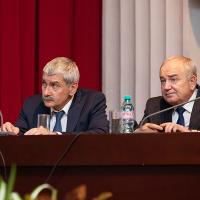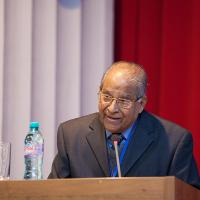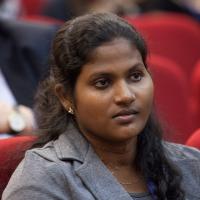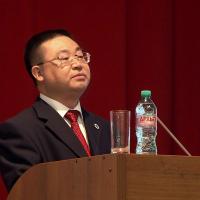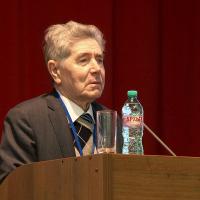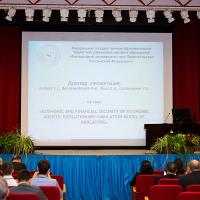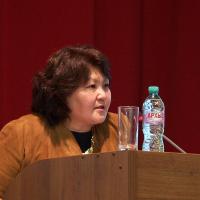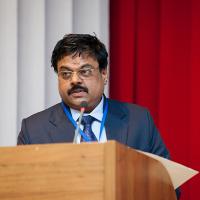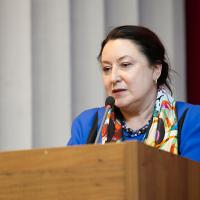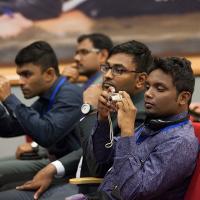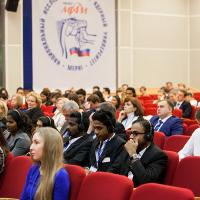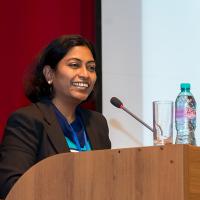A three-day scientific-practical conference on “Threats and risks for economies of BRICS countries”, held in MEPhI these days, has been continued by speeches of representatives of the expert community.
Professor Joseph Philip, President of the Xavier Institute of Management and Entrepreneurship, Bangalore, India, focused his presentation on the vital role of business education in the economic development of any country. He was followed by Professor Yuan Denghua fr om the Business School of Guangdong University of Foreign Studies (China), who supported this theme by telling the audience about the involvement of his University in the Association of BRICS Business Schools, ABBS and opportunities that this organization provides to its members.
The report of Vijila Edwin-Kennedy, Dean of the Business School of Kumaraguru College of Technology, India, was also dedicated to higher education. The speaker discussed future trends of cooperation of BRICS countries in this area, presenting plans of the Association for the future, as well as giving the audience useful recommendations.
The next report was made by the academician of Russian Academy of Sciences Valery Leonidovich Makarov, Director of the Central Economics and Mathematics Institute RAS. It was devoted to large-scale projects, namely the agent-oriented model of project management which is a tool for assessing effects of illicit financial transactions. Valery Leonidovich gave a large number of real-life examples, which made the report very clear and informative.
The theme of agents was continued by Bezdenezhnykh Vyacheslav Mikhailovich, the Head of the Department “Risks Analysis and Economic Security” of the Financial University under the RF Government, who spoke about financial and economic security of economic agents, exactly about the evolutionary-simulation model of indicators.
Bevelikova Nellie Mikhaylovna, the Head of the Department of East Asian legal studies of ILCL, the member of the National Committee for BRICS studies, provided an analysis of the existing situation in BRICS assosiation as a whole and of its individual participants, making special emphasis on economic aspects of their activities.
Rogachev Sergey Vladimirovich, Doctor of Economics, Professor of the Institute of Socio-Political Research RAS, made a presentation on the methodology and technology of research of the Russian reality according to the criteria of socio-political risks. The speaker suggested that research teams of BRICS countries should combine their efforts to solve fundamental and extremely important tasks of organization’s member states: “It would be useful to create a network theoretical and applied research projects to study a complex of risks”.
Dr. C. Samuel Joseph, Director of the Business school of the Karunya University, Coimbatore, India presented experience of his country in the field of risks. He spoke about the establishment of a comprehensive economic and legal approach to risks and threats in the sphere of combating the legalization of income obtained by criminal means and financing of terrorism.
Kechko Alexey Nikolaevich, the Vice-President, Head of the Centre of consolidated risks and methodology of the Gazprombank Group offered the audience to create an independent Rating Agency, which will become an element of the BRICS financial infrastructure.
The series of performances was finished by Vilisov Maksim Vladimirovich, the Head of Department “State control” of Moscow University of Finance and Law, the General Director of the Center for study of crisis society. He spoke about the worries and doubts existing in the BRICS countries in the moment. Maksim Vladimirovich offered the audience options of further cooperation, namely to develop supervisory authorities of financial monitoring, which were powerful analytical institutions, accumulating huge amounts of information. It is exactly these supervisory authorities which go on the front line in solving different political issues, as well as during the implementation of joint global projects wh ere exchange of information and knowledge becomes especially important.
The conference continues it work.





